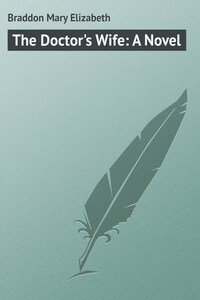CHAPTER I.
A YOUNG MAN FROM THE COUNTRY
There were two surgeons in the little town of Graybridge-on-the-Wayverne, in pretty pastoral Midlandshire, – Mr. Pawlkatt, who lived in a big, new, brazen-faced house in the middle of the queer old High Street; and John Gilbert, the parish doctor, who lived in his own house on the outskirts of Graybridge, and worked very hard for a smaller income than that which the stylish Mr. Pawlkatt derived from his aristocratic patients.
John Gilbert was an elderly man, with a young son. He had married late in life, and his wife had died very soon after the birth of this son. It was for this reason, most likely, that the surgeon loved his child as children are rarely loved by their fathers – with an earnest, over-anxious devotion, which from the very first had been something womanly in its character, and which grew with the child's growth. Mr. Gilbert's mind was narrowed by the circle in which he lived. He had inherited his own patients and the parish patients from his father, who had been a surgeon before him, and who had lived in the same house, with the same red lamp over the little old-fashioned surgery-door, for eight-and-forty years, and had died, leaving the house, the practice, and the red lamp to his son.
If John Gilbert's only child had possessed the capacity of a Newton or the aspirations of a Napoleon, the surgeon would nevertheless have shut him up in the surgery to compound aloes and conserve of roses, tincture of rhubarb and essence of peppermint. Luckily for the boy, he was only a common-place lad, with a good-looking, rosy face; clear grey eyes, which stared at you frankly; and a thick stubble of brown hair, parted in the middle and waving from the roots. He was tall, straight, and muscular; a good runner, a first-rate cricketer, tolerably skilful with a pair of boxing-gloves or single-sticks, and a decent shot. He wrote a fair business-like hand, was an excellent arithmetician, remembered a smattering of Latin, a random line here and there from those Roman poets and philosophers whose writings had been his torment at a certain classical and commercial academy at Wareham. He spoke and wrote tolerable English, had read Shakespeare and Sir Walter Scott, and infinitely preferred the latter, though he made a point of skipping the first few chapters of the great novelist's fictions in order to get at once to the action of the story. He was a very good young man, went to church two or three times on a Sunday, and would on no account have broken any one of the Ten Commandments on the painted tablets above the altar by so much as a thought. He was very good; and, above all, he was very good-looking. No one had ever disputed this fact: George Gilbert was eminently good-looking. No one had ever gone so far as to call him handsome; no one had ever presumed to designate him plain. He had those homely, healthy good looks which the novelist or poet in search of a hero would recoil from with actual horror, and which the practical mind involuntarily associates with tenant-farming in a small way, or the sale of butcher's meat.
I will not say that poor George was ungentlemanly, because he had kind, cordial manners, and a certain instinctive Christianity, which had never yet expressed itself in any very tangible form, but which lent a genial flavour to every word upon his lips, to every thought in his heart. He was a very trusting young man, and thought well of all mankind; he was a Tory, heart and soul, as his father and grandfather had been before him; and thought especially well of all the magnates round about Wareham and Graybridge, holding the grand names that had been familiar to him from his childhood in simple reverence, that was without a thought of meanness. He was a candid, honest, country-bred young man, who did his duty well, and filled a small place in a very narrow circle with credit to himself and the father who loved him. The fiery ordeal of two years' student-life at St. Bartholomew's had left the lad almost as innocent as a girl; for John Gilbert had planted his son during those two awful years in the heart of a quiet Wesleyan family in the Seven-Sisters Road, and the boy had enjoyed very little leisure for disporting himself with the dangerous spirits of St. Bartholomew's. George Gilbert was two-and-twenty, and in all the course of those two-and-twenty years which made the sum of the young man's life, his father had never had reason to reproach him by so much as a look. The young doctor was held to be a model youth in the town of Graybridge; and it was whispered that if he should presume to lift his eyes to Miss Sophronia Burdock, the second daughter of the rich maltster, he need not aspire in vain. But George was by no means a coxcomb, and didn't particularly admire Miss Burdock, whose eyelashes were a good deal paler than her hair, and whose eyebrows were only visible in a strong light. The surgeon was young, and the world was all before him; but he was not ambitious; he felt no sense of oppression in the narrow High Street at Graybridge. He could sit in the little parlour next the surgery reading Byron's fiercest poems, sympathizing in his own way with Giaours and Corsairs; but with no passionate yearning stirring up in his breast, with no thought of revolt against the dull quiet of his life.














